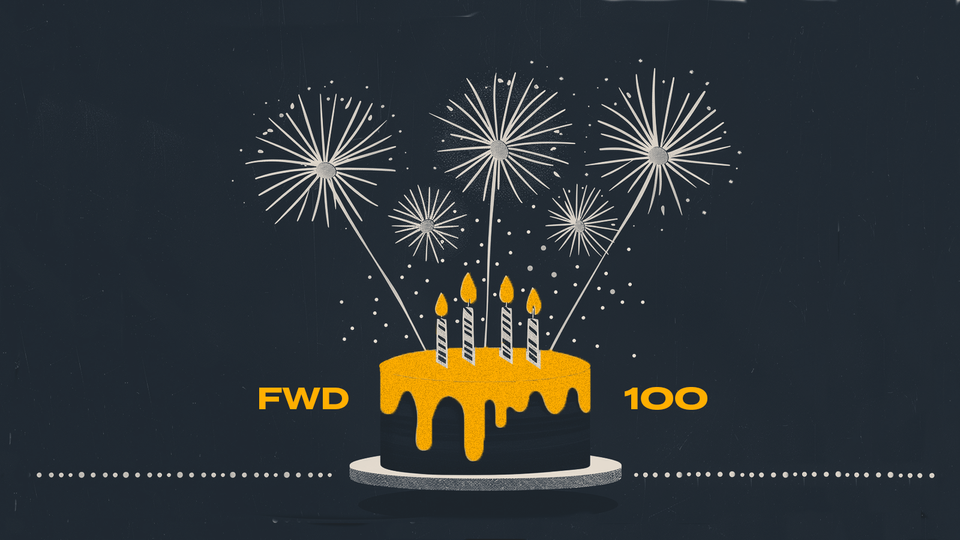
FWD Edition 100
I contemplated doing some kind of special "oh my god we've done 100 Editions of FWD!" but I'm not personally big on arbitrary benchmarks, and you, dear reader, have bigger fish to fry. So there will be no special edition today.
Unless you consider seeing the signs of a new digital economy rising a special occasion? Let's pretend that is worth celebrating. (JK, JK... It is.)
To review, I've been loud on the "AI exposes how broken and anti-consumer the internet is and is likely to get worse." (spoiler alert: everyone hates it)
Up until now, I wasn't sure what, if anything, would break through. The AI Sludge running down the mountain is immense, and sure to overwhelm the current web's already-feebled ability to act in trust. The ruling platforms are here for the data (stolen or otherwise) and the advertising, actual humans be damned. Prospects were not high.
In today's curated list of damns to give, you'll find some key signposts of a new internet rising and with it new generations who are on to the game being played.
You can't build an economy without property rights.
Fundamental to any capitalist economy is property rights. If you can't own what you build, then the base incentives for making it go away. The risk-reward balance of "creation" goes out of whack, and power pools in the oligarchic hands. Sounds a little like America in the 2020s.
The New York Times this week comprehensively covered all the ways the usual suspects are taking your data to train their bots, doing what Big Tech does best, hiding its most nefarious activities deep in the EULA.
Some highlights from the article:
- Google is transcribing all of YouTube and scanning your Google docs to train its AI. Is some or all of that your IP? Sure, but you put it on their servers, so they own it now. Sorry, suckers. (Me, I am the sucker.)
- Training AI on other people's copyrights is not enough. So OpenAI is now creating "synthetic data:" basically fake words in sequence to teach AI how to put more fake words in sequence.
The article link below is a gift link, so no NYT subscription is required.

Rise of the beta males
You couldn't scan the media, traditional or social, without hearing about the NCAA Women's Final Four. The final was the most-watched basketball game (of any type) in years. Worth celebrating. And also a return of the monoculture, millions of Americans glued to the same Bat-Time, same Bat-Channel. But... are is this unifying moment just like the old days?
As a sample exemplar, take Jason Sudeikis. The 2020s good guy persona, known for his infamous beta male, Ted Lasso, was seen wearing "Everyone Watches Women's Sports" sweatshirt. The combined ethos of the hyper-positive and emotionally self-aware Lasso with the dare we say, "feminist" spokesmodel moves at the NCAA tournament reinforces a trend:
We are in the Age of the Beta Male and marketing for all brands should reflect the shift: gentle-spirited, optimistic, casual-styled, unencumbered by egoic pursuits, and decidedly pro-women. Brand leaders take note:
The monoculture still exists and it's moving to a new place.

Let us pick for ourselves, dammit
Much of the talk around social media focuses on the big platforms, but in typical disruption fashion, Gen Z providing a new wave of Pinterest usage. One of the driving factors? The ability to define their own taste, rather than be overrun by influencers and ads.
I said it here first: The rise of Tastemaking as a driving factor for brand growth is where the puck is going. I wrote about the natural implosion of the recommendation systems that power the rest of the internet. This shift at Pinterest is an early sign of what comes next.

You mean people paid to pretend to buy products in their Insta-Stories isn't working?
New data is now flowing in that the "influencer economy" is not all it was cracked up to be. Color me Not-Surprised. The phony 1980s infomercial "wouldn't you want to eat these TidePods too?" style of product placement is only effective for a very, very elite few accounts. And with nearly 60% of social content getting NO ENGAGEMENT AT ALL, and platform usage falling across the board... the promise that we could wholesale our brands to Meta and Google fails again. The big platforms are in full extraction mode, and adding value to users is a long-lost memory of an internet we can barely remember. How long with the platforms power users (those trying to build their clout to influencer status) continue to believe Meta/Google/TikTok cares about their economic well-being?

In Summary
You made it this far? I'm grateful to you. As the famous saying goes, change happens slowly and then all at once. It's clear that the pressure of our humanity against the mile-thick concrete wall of the corporate platform internet is making cracks, albeit small ones.
As for you, this is no time to sit around trying to build your business on 2019's best marketing ideas. (Seriously check the marketing strategy of your agency and see how different it is from what they would have done in 2019.)
Put your growth in the hands of people who are making trust make growth. You know... US.
Stay brains on, heart open, forward progress.



